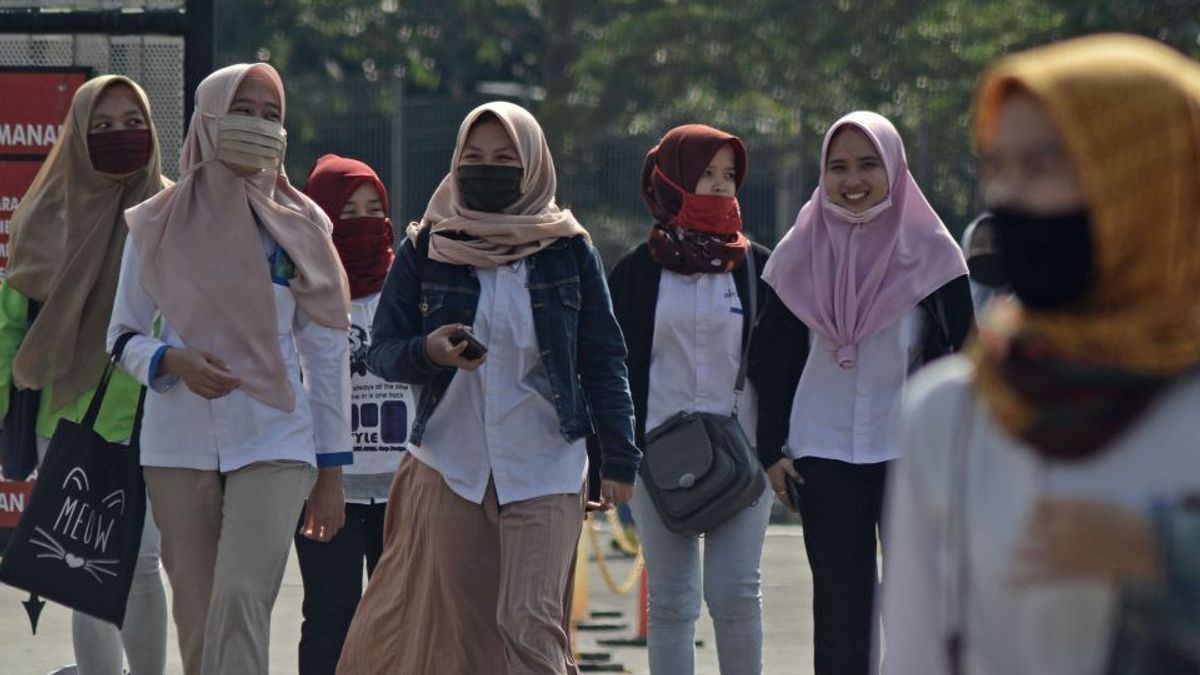JAKARTA - The Indonesian House of Representatives encourages regulations to develop the people's economy in all regions to improve the economy. This was done considering the significant decline in the number of middle classes.
"We need to improve the regulation by revising the design and spatial planning (RDTR) in accordance with the needs of each region or more flexible to the regulation. So that investors who will enter can be easier and help the people's economic development," said Member of Commission II DPR RI Mardani Ali Sera, Thursday 19 September.
Data from the Central Statistics Agency (BPS) shows that the number of middle class residents has dropped dramatically. In 2019, residents who entered the middle class were still around 21.45 percent of the total population of Indonesia or 57.3 million people. In 2024, the number of middle class residents was only 17.44 percent or 47.85 million people.
According to Mardani, one of the causes of the decline in the middle class in Indonesia is the regional autonomy policy that does not support the development of the people's economy.
"Right now, home business is difficult because of residential areas. It should be easier to make the circulation of money easy. On average, our city is bound by regulations," he said.
"So it's about how spatial planning makes it easier and flexible so that from residential to commercial it can be easy," continued Mardani.
By facilitating the revision of the RDTR, according to Mardani, this can make the economy of the middle class increase. He also gave an example of Singapore which makes it easy to quickly adapt regulations for investors to invest in an area with the consequence that they have to spend more money.
According to Mardani, this is to help the economy of the surrounding community to move.
"For example, in Singapore, it's a residential area, but it wants to be commercial, it's okay to just pay. There is a rate, but they have to pay the local government to prepare parking space, enlarge space, and so on," explained the legislator from the DKI Jakarta electoral district I.
"By facilitating the rules, the circulation of money will increase," added Mardani.
In Indonesia alone, the revision of the RDTR can only be done once every 5 years. Mardani said this could make it difficult for regional progress considering the development of the times of moving fast and causing investors who want to enter areas such as housing, commercial or industrial to become more difficult.
"But there are also areas that are more flexible because the local government wants to collaborate and be adaptive to make the community's economy move. We can see the BSD area and also Summarecon Bekasi, moving forward now because it is easy for him because there is a estate management that regulates it," he explained.
With local governments giving space for investors to develop residentials, people in these areas can benefit from being able to participate in accessing the facilities and facilities prepared by the developer.
Pemda memberi ruang sehingga masyarakatnya juga berkembang. Karena pengembang diberikan ruang lebih, akhirnya jadi ada sarana untuk masyarakat berkumpul dan beraktivitas, tutur Mardani.
"Want to jogging, there are good cafes that are affordable. So the economic development is good, and the residents also feel it," he added.
Mardani also gave an example of Anies Baswedan who built Ecopark Park when he was still the Governor of DKI Jakarta. By utilizing cooperation with developers, the local government is said to be able to improve the quality of the welfare and economy of the citizens.
"Like Anies Baswedan is good, making the ecopark place good, people are busy going there, he collaborates, it's good and running. Now regional heads and regional bureaucrats have to think like that, don't waste the budget just live the project but don't make the area develop," explained Mardani.
"The rules are facilitated but at the same time the implementation must be collaborative," he added.
However, Mardani said that not all regions open access to developments like that.
"The problem is that there are still different regulations in each region, all depending on regional leaders or heads such as the Governor, Regent and Mayor respectively," said Mardani.
Commission II of the Indonesian House of Representatives in charge of regional autonomy affairs also hopes that regional heads and bureaucrats will work really for the welfare of their citizens. This is important because there are still many bureaucrats in the regions who only take care of their respective interests and are reluctant to collaborate with the developers for the progress of their regions.
"We want regional head bureaucrats to think about it (providing business space). So the middle class can take advantage of the land. Imagine if the residents were happy, had the convenience of doing business and the automatic facilities they would be productive, so if they were productive, the economy would definitely develop," explained Mardani.
"City growers are assisted by private parties, apart from the APBN and APBD which provide so that people grow. But what is currently the state's money is only for projects, the important thing is to spend the budget but not think about the development of its citizens," he continued.
Over the past five years, as many as 9.4 million people have dropped class, some have become groups 'to the middle class' or middle class between the middle class and the poor vulnerable class. Then there are middle classes that fall two levels down to become 'poorants' groups.
SEE ALSO:
Mardani said the decline in citizen classes was the impact of various problems in developing the country, including in the social and economic aspects.
"Essentially, if the tax economy develops, the tax increases in quality education, the health is quality, so the city is liked by people. So everything is sustainable, then we have to finish it from upstream to downstream," said Mardani.
"Well, the condition was that the residents were really happy, now that is the task of the local government to create regulations that support the happiness of their citizens. So the local government must be brave, the spatial planning must be resolved," he continued.
Spatial management is often a problem for a number of regions in Indonesia. Because there is still a war of interest between sectors and local governments.
Therefore, Mardani emphasized the local government to be more concerned with the needs of residents and collaborate with the private sector. Local governments are asked to provide ease of regulation with investment requirements to support the development of the local community, especially in terms of the economy so that various problems can be resolved continuously.
"There are a lot of them, there are 100 problems. If there is a button we press, another problem will be resolved by itself. This is what happens about the middle class decline phenomenon," concluded Mardani.
The English, Chinese, Japanese, Arabic, and French versions are automatically generated by the AI. So there may still be inaccuracies in translating, please always see Indonesian as our main language. (system supported by DigitalSiber.id)















